![]()
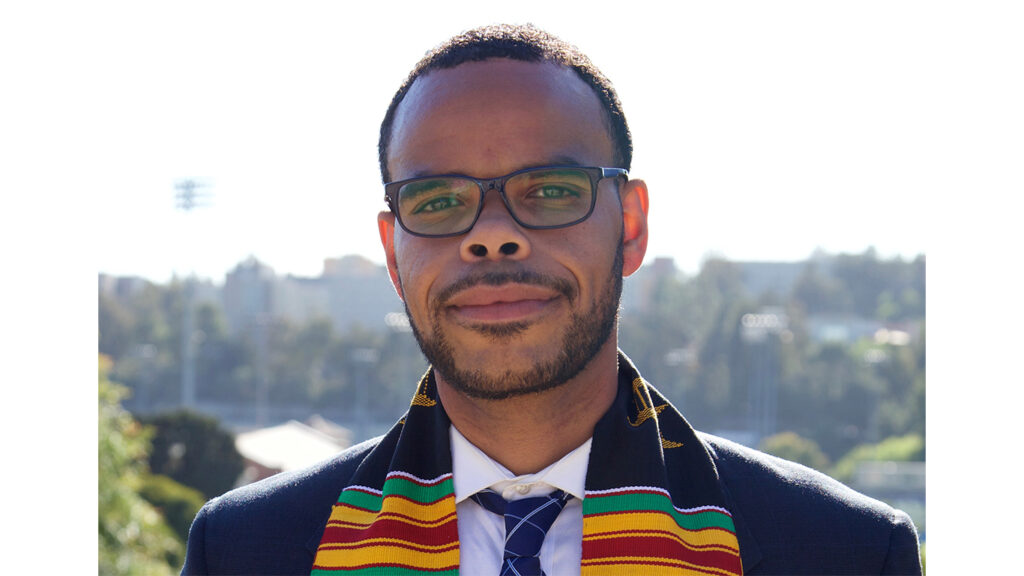
JOSEPH'S STORY . Joseph is the president and co-founder, along with Racquel Decipeda, of Hearts for Sight Foundation, a Los Angeles area based non-profit that seeks to enhance the physical, social and mental health of the visually impaired community. I met Joseph as a volunteer on one of the hikes that HFS had organized and soon wanted to learn more about him. He has a masters in social work from UCLA and lives near Los Angeles with his partner, Bernice. Joseph, like his H4S community is visually impaired.
Joseph says the following of himself:
"I had a pretty wild childhood experience filled with adversity, and what some might call turmoil, but it's shaped me to be quite a resilient person, knowing what I’ve been through growing up. It’s a story filled with triumph, resiliency and persistence to try to create something out of a life where I was dealt a pretty short hand. So when I reflect back on where I was as a youth, as a child, as a teen, as a young adult, and what had transpired, as to where I am now and how I got here, it’s quite an amazing feat."
Joseph was being raised by his grandmother, but was placed in the foster care system at the age of 5, for reasons that are not clear, except that he seemed to be reacting to a rather chaotic situation at home. He never returned to his grandmother's home till he "emancipated" from the foster care system at the age of 18. Being raised in group homes, experiencing a sense of loss and family connection, he was seen to be "acting out" and placed on strong medications at a very young age. As he grew older, his family visitations were increased, and during his teen years, he felt that he found a caring therapist who helped him to set goals in his life.
Joseph achieved the goals he set for himself. He completed high school on time, got himself off the medications and completed his final goal of making something of himself. He had a lucky break in high school, when for the first time since he was 5, he got to leave the group home and live in his own home with a former staff member who became his adoptive father.
In his lifetime, Joseph has had to deal with parents that were barely present in his life, frequent moves, growing up in group homes in the foster care system and loss of his eyesight. Through it all, Joseph has become a thoughtful, creative and caring adult who lives his life to better that of others. He says he is grateful for the opportunities presented to him and for the support of mentors such as Ed Earl and families such as the Grippos.
JOSEPH
![]()
![]()
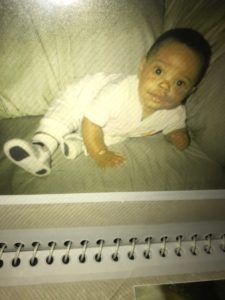
![]()
![]() I was born in Lehigh, Pennsylvania in 1988. I’m a Libra born October 4th. I had a pretty wild childhood experience filled with adversity, and what some might call turmoil, but it's shaped me to be quite a resilient person. It’s a story filled with triumph, resiliency and persistence to try to create something out of a life where I was dealt a pretty short hand. So when I reflect back on where I was as a youth, as a child, as a teen, as a young adult, and what had transpired, as to where I am now and how I got here, it’s quite an amazing feat. But we’ll have time to get into it.
I was born in Lehigh, Pennsylvania in 1988. I’m a Libra born October 4th. I had a pretty wild childhood experience filled with adversity, and what some might call turmoil, but it's shaped me to be quite a resilient person. It’s a story filled with triumph, resiliency and persistence to try to create something out of a life where I was dealt a pretty short hand. So when I reflect back on where I was as a youth, as a child, as a teen, as a young adult, and what had transpired, as to where I am now and how I got here, it’s quite an amazing feat. But we’ll have time to get into it.
MY FATHER
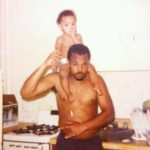
I don’t really know much about my father. He was Jewish African American, and from what I understand, he was from the Providence, Rhode Island area where my grandfather was a Rhode Island State Trooper. My grandmother was kind of a light-skinned Jewish lady, so that’s where we get the Jewish in our family—my dad’s side of the family. I never had much of a relationship with my father. After moving out to California at a very young age, I lost contact with him. And then he passed away in 2007, but it was 8 or 9 years later that I found out. I don’t think I ever spoke with him outside of being a young, young, young child.
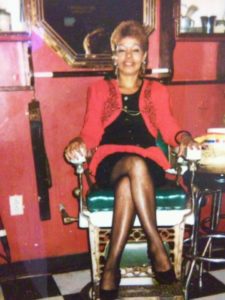
MY GRANDMA AND MY MOM
My grandmother was born in Puerto Rico and migrated to New York where she had my mother. She wasn’t the most educated person and was a victim of domestic violence, constantly having to flee for her life and safety with my mother, who is her oldest child. Because she witnessed domestic violence in her life as a young child, she really had to grow up fast. I don’t think my mom had much of a positive childhood experience in New York of the 70s in the Queens/Bronx area . It was a very fast paced environment just full of bad things. A lot of people trying to get by with what little means they had available to them. And so my mother and my grandma were victims of that circumstance.
Act 1 is what had happened to me growing up to the point where I became a teenager.
MY MOM IS MIA
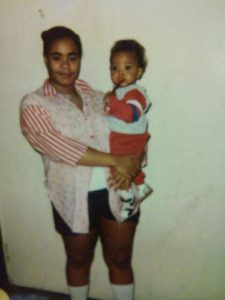
My life had so much chaos in it because my mom had such a chaotic lifestyle. When I was very young, we moved from Pennsylvania to Rhode Island. While over there, when I was about 3 ½, maybe 4, my mother was gone for a very, very long time. This is just a very faint memory that I have. I remember being in the car, waiting for my mother for a few hours, I think, with my little brother and my little sister. My brother must have been a little baby and my sister was just like a year old. I remember sitting in the back of the car waiting for her. And my mother just never came out of the house that she was in. And after sitting there for a few hours, one of her friends took us in and we stayed there for, I want to say, a week or 2. My mom was MIA and we had no idea of her whereabouts.
THANK GOD FOR GRANDMA
So the person that we were staying with in Rhode island, called my grandmother in San Diego, and said somebody needed to come get us kids. The lady said she couldn’t take care of us anymore and if someone didn’t come, she was going to call CPS (Child Protective Services)” out there in the Rhode Island area.
And so, my grandmother, and thank God for her, she sprung into action and drove her car from San Diego to Rhode Island. came and got me, my little brother and my little sister and then drove us down to Florida where she had relatives. We stayed in Florida for a couple of weeks until my grandmother was able to settle things such as getting an apartment to take us to San Diego.
WE GO TO SAN DIEGO
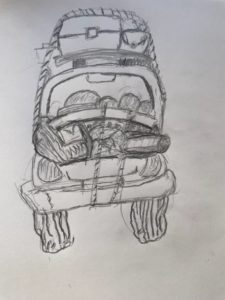 We traveled to San Diego with Grandma in a very, very, tiny car filled with all of our stuff and 3 kids, and we traveled like that all the way to San Diego.
We traveled to San Diego with Grandma in a very, very, tiny car filled with all of our stuff and 3 kids, and we traveled like that all the way to San Diego.
I was about 4 ½- 5 years old when we moved to San Diego. Before that, because I didn’t have parents watching over me, no one had really taken responsibility for teaching me how to be a young child, never teaching me much about wrong from right. A lot of times my brother, sister and I were left on our own—throughout life prior to getting to San Diego.
So when I got to San Diego, I had behavior that my grandma had a hard time controlling. The only person I would listen to was my mom. And so, as I got older, my grandmother would have to say things like, “Ohh, when your mom gets here, I’m going to tell her things like you did X, Y and Z. And you’re going to get in trouble”, because I wouldn’t listen to my grandma. I knew it was just a threat because I knew my mom wasn’t around.
MY MOM COMES BACK
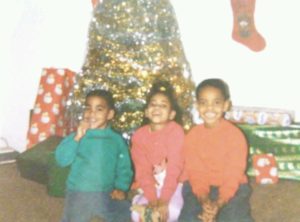
So when my mom actually got out of, I think, jail, she moved to San Diego with us. I was barely just turning 5. And then things got just a little bit worse, I want to believe, because she quickly got into another fast lifestyle because that’s what she knew. And as she got into that lifestyle, got involved with the wrong people, my behavior reflected in that.
This is how we lived together, my 2 younger siblings, my mom and grandmother. And it was nice to have my family there, but my mom wasn’t always around. She’d leave and wouldn’t come back for a couple of days, or come back late, late at night. There were instances when bad characters would be around the household and just people that were not in the best interests of us younger kids. It just never was an environment that was good for children.
I AM TAKEN AWAY FROM MY FAMILY
As these environments became worse and worse, my behavior reflected and became worse and worse. So when I was about 5 ½, I think someone in the neighborhood must have called Child Protective Services and told on my grandma about her not being able to care for me and my other family members, my brother and sister.
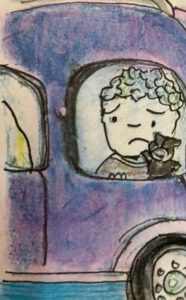 Because of an interview I had with CPS at school, I was taken away from my entire family. Just me! I was stripped away from my entire family, which was kind of devastating. I remember being in the back of a black sedan. Well, first being stripped away from my grandmother, which was terrifying. I remember being taken by a social worker and an officer and being placed in the back of a sedan and staring at my grandmother through the back windows as we were being driven away.
Because of an interview I had with CPS at school, I was taken away from my entire family. Just me! I was stripped away from my entire family, which was kind of devastating. I remember being in the back of a black sedan. Well, first being stripped away from my grandmother, which was terrifying. I remember being taken by a social worker and an officer and being placed in the back of a sedan and staring at my grandmother through the back windows as we were being driven away.
And that was a constant thing for me– Waiting, gazing out, like searching for my family. And in this particular case, I was being taken away from my family, just watching them as I was being driven away by the social worker and CPS in this black sedan. And that was a memory that I always will have because I was heartbroken, I was just terrified. I was sad, I felt guilty. I felt all these crazy emotions like all this stuff was my fault, because I was the only one that was taken away!
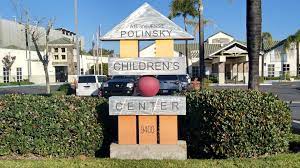 POLINSKY
POLINSKY
When I got taken away by CPS, I was placed in this temporary facility called Polinsky, a place where kids would go when they got taken by CPS. It’s a temporary holding place until your social workers are able to find you more permanent housing.
I just shut down for a couple of days. I didn’t want to leave my room, didn’t want to do anything, I just got really, really depressed. But after a week of being there, I finally came out of this depressed funk and was able to interact with the campus. The campus had a cafeteria, a basketball court, playgrounds, a pool, all of this space to play sports. I thought it was going to be temporary and I was like, “This is a fun little camp with a bunch of other little boys and we can just play and be children.” It was actually the first time that I was able to be a free kid. Of course, there was discipline and structure which I was definitely not used to, but I felt safe, I felt secure. They had an amazing cafeteria that had food that was just available. It really was a safe place to be.
6 YEARS OLD AND I DON'T SEE MY FAMILY
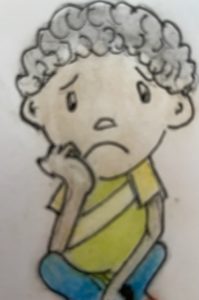
And for me, I thought this was awesome until I realized that this was going to be where I was going to be for quite some time. That I wasn’t going to go to my grandmother’s anytime soon. I was there for a while and even though it was safe, it wasn’t with my family and I would have rather been with my family. After having been there for a couple of weeks, realizing that—" OK, I’m not seeing my grandmother.” Not knowing what’s going on- “Why am I still here? How come I’m not seeing my family? Am I going to be able to live with them?” And so, then my behavior started to go up and down.
I MOVE TO OTHER HOMES
I moved to 3 different homes after that until the age of 13.
The first one, the Ranch, was in a remote area. It was like a boarding school for boys, not like a traditional foster home where you have a parent with one or more children. I was just 5 ½ - 6 and I was amongst older kids, so that was kind of scary too. And so, yeah, I don’t really have great fond memories of that place because again, I was feeling depressed about not seeing my family. And since I got taken away, I want to say, up to this point, maybe a year, a year and ½, I never saw my family. And that was really sad.
After that, I moved to this other group home in El Cajon. It was more like a traditional group home where you have this rotating staff. It was in a residential house and you have a roommate and it must have been a 5-bedroom house. So maybe 10 kids at that group home.
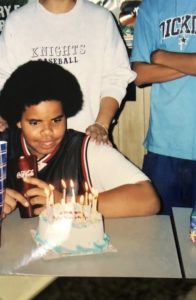
When I was about 9, I went to another group home in Imperial Beach called the Children’s Treatment Center (CTC). It was a really nice group home on the outside. It had a pool, which was really awesome and it was a couple of blocks from the beach. Across the street was a park for playing sports where I played basketball and baseball. I was playing all these incredible sports. I stayed there till I was about 13 when I aged out.
So from the age of 5 to the age of 13, I was moved to 4 different group homes. It was hard moving constantly, and every time I moved, it was like I lost a whole group of people that I had grown up with or got the opportunity to meet and become friends with. And then I would leave them behind. I haven’t really kept in touch with them once I left them behind. There have been some that have reached out to me from the group homes via Social Media. They’ll say, “Do you remember me?” And a lot of times I say that I really don’t. Because those times were not the best times.
MY SISTERS AND MY BROTHER
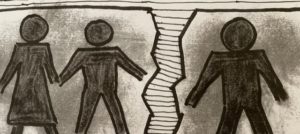 I always felt like this outcast, “What did I do to not have the opportunity to live with you guys?” Because my grandmother still had custody of my brother and my little sister. Until that wasn’t the case. Eventually, my little brother and my little sister went into foster care, and they had their own behavioral challenges which I am not going to go into details as to what their challenges were. But, you know, they went into foster care. But, fortunately, for the 2 of them, they got to go into foster care together.
I always felt like this outcast, “What did I do to not have the opportunity to live with you guys?” Because my grandmother still had custody of my brother and my little sister. Until that wasn’t the case. Eventually, my little brother and my little sister went into foster care, and they had their own behavioral challenges which I am not going to go into details as to what their challenges were. But, you know, they went into foster care. But, fortunately, for the 2 of them, they got to go into foster care together.
So, they lived together, whereas I lived in group homes, not in traditional foster care. Where they had foster parents, I had staff members that weren’t able to show affection, weren’t able to hug kids. The staff wasn’t able to show any sort of remorse or love to the kids that they worked with because that blurred the boundaries between staff and child. In the group homes they never wanted any of that. They were instructed not to show affection. You couldn’t hug, couldn’t hold kids that just wasn’t part of their job. They weren’t supposed to do that stuff.
My 3 older sisters had different fathers so they had different branches of family they could connect with and go under the kinship of. We were able to have conversations as older adults, to better understand what the circumstances were at that time that influenced those decisions that were made. And, Thank God, we have all turned out OK.
MY GRANDMA TRIES TO GET ME BACK
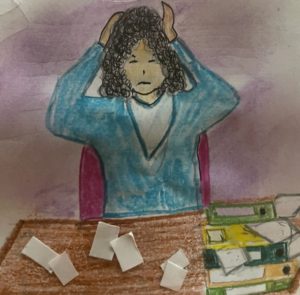 During this time, I didn’t know this, my grandmother was trying to get me back. But my grandmother’s challenge was that she wasn’t a very educated person, so she was not able to understand the paperwork. She was not able to effectively communicate what her challenges were and some of the things that she needed to do to get me back.
During this time, I didn’t know this, my grandmother was trying to get me back. But my grandmother’s challenge was that she wasn’t a very educated person, so she was not able to understand the paperwork. She was not able to effectively communicate what her challenges were and some of the things that she needed to do to get me back.
And so, the system failed her in a way, because they couldn’t communicate with her in a way that she could understand. She was deemed unfit to take care of me because of her uneducated self, which was really unfortunate. This is kind of a problem we see quite a bit in Latino and Latina families. Because you get these grandmothers, who are, you know. first generation or migrant grandmothers trying to take care of their kids because their parents are not able to do so. They’re still able to parent, but they just don’t speak the language because they don’t have the formal education.
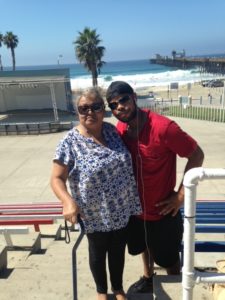
And so the reunification was a failure because of that. We never had an opportunity to live with her and that was a real bummer. But my brother and I and my sister, we really love Grandma for being there as much as she was for us. Because we know that she really tried her best. My grandmother would come and drive up and see me. She would take the bus to come see me. She did so much with so little to try to support us. And for that we’re just forever grateful, and she’s like our little queen for doing that for us.
I AM STILL IN A GROUP HOME WITH VISITATIONS
And so, I continued to live in group homes. I think I was in first grade, living at El Cajon, and at this point, I was just barely starting to get visitation again with my grandmother.
When my visitations with my family were reinstated, my mom and my grandmother, whenever my mom wasn’t in prison, were able to come to that group home, and visit me. Which was nice. I had visitation with my family, my mom and my little brother and sister. They would come every so often to visit me, and it was always such a great pleasure to see my family.
My grandmother would try to be consistent, but for her to come see me, they would have to travel via bus and train, and I know now that it would take them just hours to come see me.
Whenever they came, I was just so excited, from waking up on that morning, just full of excitement, full of joy and I was so happy about it, that when they came, it was just amazing, it was great, I loved it.
SOMETIMES THEY WOULDN’T MAKE IT
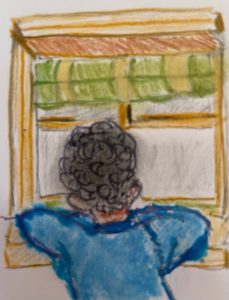 I remember waiting for my family, looking out my window, because my room sat in this space where you could see down the street, when my family would come off the bus, so whenever they were walking, I could see them. I would sit there for hours. I didn’t want to eat, didn’t want to do anything and I was telling the group home staff members that my grandmother is coming, they’re coming, they’re coming. And I would wait there for hours and hours, and there was one time they came. It was some 3 hours later, they came. And I was like, “See? They’re coming, they’re here!” I was young and I didn’t understand the concept of time and they needed to be on time for their visitation. But I was like, yeah, this is reassurance that they were going to be there when they said they were going to be there.
I remember waiting for my family, looking out my window, because my room sat in this space where you could see down the street, when my family would come off the bus, so whenever they were walking, I could see them. I would sit there for hours. I didn’t want to eat, didn’t want to do anything and I was telling the group home staff members that my grandmother is coming, they’re coming, they’re coming. And I would wait there for hours and hours, and there was one time they came. It was some 3 hours later, they came. And I was like, “See? They’re coming, they’re here!” I was young and I didn’t understand the concept of time and they needed to be on time for their visitation. But I was like, yeah, this is reassurance that they were going to be there when they said they were going to be there.
But there were times that they didn’t come. I’d sit at that window and wait for them, and then they wouldn’t come, they just didn’t come. It was devastating. I would go into this super depressed state and my levels of anxiety, my depression and my explosive behavior would just come out of me and that would tear me up again. I wouldn’t engage with anybody, I would be explosive or I’d get angry. They’d have to restrain me because I was just a harm to others, sometimes myself. I was a child, I was six years old, my whole body was like, hit things, throw things. I would have extreme temper tantrums, to the point where staff had to restrain me.
MEDICATED

I was heavily medicated because I was dealing with so many emotions that I was not able to regulate . On psychotropics, behavioral stimulants, I had problems sleeping. I was so doped up on medicine that I had a hard time controlling my bladder throughout the night. And I had to take nasal injections to help me sleep. I was just so doped up on medication from like 6 till maybe like 14.
With all these medications that I was taking, I felt so aloof, my personality was almost gone, I felt lethargic all the time. I gained so much weight. My weight gain was just through the roof. Which was crazy because I was so athletic, I was quarterback for my football team, I played basketball, I played baseball, I rode my bike everywhere. But because I was taking all this medication, my weight was just through the roof. And as a kid I was on a diet. They wouldn’t let me eat seconds! I couldn’t eat any seconds! I couldn’t have extra food, I was just on this crazy strict diet.
IT'S ALL OF US
It wasn’t just me and my circumstances, but all those kids that were living at group homes were all doped up. Because there is huge money that goes into medicating kids. You know, when all of these kids are on psychotropic medications, who’s getting the money from that? It’s the psychiatrists that we were going to see every month. This psychiatrist would just pump us with medications and of course we were forced to take the medications. We’re kids! And if we don’t take the medication, we were going to be on restriction. And if we are on restriction, that means we were not going to have privileges to go play sports, go to our pool or the beach or go ride our bikes. You either take this stuff or these are the consequences for not taking it. So, we were forced to take them, we didn’t want to lose out.
THERAPY
I remember getting psychotherapy. When I was little, It was play therapy, I had to put stuff together in a sandbox and the therapist would take a picture. And I had to describe to her my feelings. In Imperial Beach I was older and I went to the Children’s Treatment Center (CTC) . My psychotherapy was given to me by this lady called K. I always remember her name—I hate that name. She would flush when she was flustered, I still have this vivid image of her. She always gave me talk therapy. And I feel that in some ways she was trying to educate me on what my mom was doing, but in a way that she was trying to create these barriers between us. Because she knew—everyone knew—that I was so connected to my mom that whenever my mom did something or didn’t do something, it would affect me in some way.
MY MOTHER IS PART OF IT
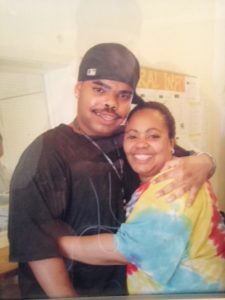
My mom would come and visit me and she’d bring me gifts. She was always well-liked by the staff members, they would love to come and see Miss Sonya come to the group home. But other times she wouldn’t come and K. realized that my behaviors, going forward or regressing, were connected to my mom, and “When something happens to your mom, it affects you in these ways.” My mom and I would believe that K. was trying to just separate us. And I don’t know if that was the case, but that was kind of what was going on then.
A NICE PERSON—JOSEPH W.
There was this gentleman I really was very, very fond of named Joseph. I would pretend that this guy was my dad. He was this humongous dude, a jokester. He was fun, full of life and I loved that. On the days he worked at that group home, he was kind of like our dad, a big, jolly man, so full of life. So that was the guy I grew a liking to. I always wished that guy could adopt me, you know. Because I would love to be his son, he was such a sociable dude. So that was a positive, male figure I had in my life at a group home. I didn’t stay in touch with him.
And it's just sad, because when I grew up, I always wanted to have a foster home, foster children myself, because I know what its like to be in a foster care situation and not have the things that you need. Love, care, security, comfort. The staff is not allowed to hug you or show you any kind of physical affection. To not have those things–how detrimental it would be for any kid? Whether you’re white, black, Mexican, Chinese. Not having these things, these fundamental ingredients to childhood development, it can cause youth as they age to have such an adverse adulthood experience, and it's tied back to their childhood.
P. GETS IN TOUCH
There was one staff member from one of the group homes that reached out to me when I started really changing my life around. In my mid-twenties, when I was laser focused on what I wanted my life to be, I became a really strong advocate for foster youth. And I was doing a lot of speeches, I was campaigning, I was helping organizations doing fundraising, like at galas doing speeches to help them raise money. And I would record them.
And then one of the staff members named P. reached out to me. She was basically apologetic for our treatment at CTC group home. Because she knew that the way we were being treated was not good. Like all the medications, and the things we had to do. It's like the generals having to obey orders, she was just obeying orders, but she knew in her heart that what they were doing and how they were doing it was just so wrong. And she was saying in her messages that her heart was just broken.
WHO'S MAKING MONEY?

And so, after I left that group home, aged out of that group home, things were happening there that eventually forced it to shut down. That one was shut down because of the way kids were being treated in that space. I learned that from P. She said that shortly after I left things were starting to spiral out of control until the group home had to be shut down. Which was great because I hated K so much!! I think the guy who owned the group home was a public figure in Imperial Beach, and I gather he was using the group home as a way to create cash.
With all this money, the psychiatrists are being paid, the social workers are being paid, like all these different parties have their hands in this pot, but ultimately, the persons who are running the group home, like the head of the group home, is just generating a tremendous amount of money. And you wonder, “Are you really doing these things in the best interests of these youth? Or are you doing it in the best interests of your pocketbook?"
But for me luckily, there was Act 2 and 3.
Act 2 is that transition from that tumultuous group home experience to moving way far away across the County to Escondido, way far away from my family. From that point to my early 20s is Act 2.
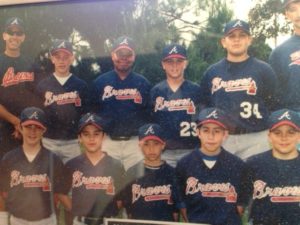
I MOVE TO ESCONDIDO
I was removed from the Imperial Beach group home because I was 13 and I went to a group home in Escondido called Circle of Friends. And from there I went to Middle School called Del Dios.
At Escondido, I took charge of my environment, I took charge of the opportunities to play sports. I was in regular Ed classes but I had an IEP. I had a great time, I was very active, playing sports. I remember in 7th grade, I was on 3 basketball teams. I was very athletic, I was well-liked instantly when I moved to Escondido.
MY MOTHER IS GONE AGAIN AND A NEW THERAPIST
In my 8th grade, my mom went to prison for a long time. And this is really where my life started to change. When she went to prison, I realized that she was going to be there for a very, very long time and this idea that I had to be reunified with her was not going to be existing anymore. Because by the time she got out of prison, I would be 21 years old. Already, basically a young man. So it was an unrealistic expectation that I was holding on to, and once I realized that, I was really able to move forward with my life.
And so when my mom was in prison, my new therapist and I talked about the reality of the situation. She said, “Joseph, this is the situation that you’re faced with. And you know, reunification is highly, highly unlikely, and if you’re going to be here and age out, what are the things that you want to accomplish while you’re living here?” YC—that was my therapist’s name. And she was incredibly influential in my life. The best therapist a kid can ask for. In fact, she was so incredibly great, that years after I emancipated, YC was running Circle of Friends, she was like the head of Circle of Friends. And I went back in my mid-20s to share my appreciation and thanks, and, yeah, she was still the sweetest little Indian lady —I think she was Punjabi, actually.

I SET MY GOALS
This lady was just incredible and really got the crux of my feelings about what I really wanted to be in life. And when she asked me the question, “What do you want to accomplish while living in this group home?” I told her I would like to accomplish 4 things. They were really specific goals. I was an athlete so I knew about setting goals, but creating life goals was not anything that I had ever experienced. So to be able to come up with those specific things that I wanted was really profound for me at that age. YC was really instrumental because she gave me a timeline.: “What do you want to accomplish by the time you emancipate from here?” Which is senior year-18 years old, which is 4 years from now. A 4 year plan was what she was giving me. And this is what I laid out for her:
GOAL 1
I told my therapist that I wanted to get out of special education.
Through my early years at El Cajon, I had a hard time being successful in public education because of everything I had been through. I had temper tantrums at school. I would get in fights, I would not listen to teachers. I was just very, very explosive and public school was not a good setting for me. The public-school teachers were not equipped to deal with a child like me with depression and feelings of abandonment, which was really what I felt. Class size, kids teasing. I got into a lot of fights. And I was a big kid, so if you’re going to tease me, I’m going to beat you up.
And so, because of that, I had to go to this private school for kids with behavioral disturbances. This place was called Hazeltine. When I was there, at Hazeltine, they had staff members that were equipped for dealing with kids who had behavioral disturbances. But they also had the educational setting that was conducive for my development. I was always bright. I was always good at math, and I was always sufficient at my reading level for my age group. My science was, you know, sufficient. What I lacked was behavioral stability, so my educational attainment was lacking because of my behavioral disturbances. Once I became much more stable in school, and at home, I experienced a lot of great success in school.
In 6th grade, I was still living in Imperial Beach at this time, I was able to move out of Hazeltine and go back to public school. I would have my normal math classes, English classes, science classes, whatever, but I would have the home base. I would get extra time with my teachers, some extra tutoring, opportunities to help me keep up with those courses through middle school.
Now, in 8th grade, I was excelling academically, and I wanted to normalize myself in regards to being like my other peers. Although being in the group home did not make me feel like a normal kid, when I was in school I felt like a normal kid because I was not being reminded that I was living in a group home. I was a student in regular public education. And, being in special education reminded me that I was a little bit different and I didn’t want to be different. So I worked incredibly hard to try to get out of special education—so that was the number 1 goal that I had.
GOAL 2
And then the number 2 was that I wanted to get off the medications.
As a testament to what a kid is doing both academically and at home, and as progress was being maintained over an extended period of time, psychiatrists would wind down the medication. I was going to my psychiatrist for my monthly meeting. They would get my reports from my group home and they would have nothing on it.
In group homes you’re on these A, B, Cs. If you were an A you would have more privileges than the Bs. If you were a B you would have more privileges than the C. If you were a C, you had limited privileges like going to bed early, lost allowance, things like that. You would be on restriction, there would be the 3 day freeze, where you’re on restriction for 3 days. You could get one for not making your bed. Then you’d get re-evaluated. There was even a weeklong risk–a 7 day restriction losing all privileges. This could come from getting into a fight or getting suspended from school.
So for me they saw I was maintaining. I said I didn’t need that medication and the psychiatrist said prove it to us that you don’t need it. So I said OK , ” Lets do what we gotta do.”
So sophomore year I’m off the medication--my last meds! And I was doing well!
GOAL 3
Another goal was that I wanted to graduate high school on time with my peers.
I had a lot of friends that were going to go from middle school to high school from 8th grade, and I wanted to graduate on time. You know, graduation was always something that was special for me and I wanted to do it with my friends. I didn’t want to have setbacks. Every school that I went to, I always had a lot of friends. Friendships are easy for me to obtain. As I got older and more giving, it made being friends easier. You’ve seen me when I'm out and about (with the organization he co-founded, Hearts For Sight). I’m really invested in what others are experiencing, and when I was younger, I was more concerned about what others thought about me because I was a group home kid. And so I wanted to be friends with people because friends were a way for me to cope with the crazy stuff that I had going on at home.
I met that last goal. I ended up graduating, did the whole awards ceremony, senior nights, it was a regular high school experience. And it was incredible to accomplish that, and not only to accomplish that but to accomplish so much more. I graduated with my peers and went on to college.
GOAL 4
My last goal, which was really profound for a 13 year old, was that I didn’t want to end up like my mom.
I said I didn’t want to follow my mom’s footsteps. Because I knew she was not doing the best she could be doing to help get her family back or to get her life back in order, that was a significant goal I had for myself.
All of us, thank God that we are all OK. We’re not criminals, we’re not drug dealers, that we’re not in and out of prison, like my mom was, because…you know the saying “The apple doesn’t fall far from the tree’' Because of my grandmother-my mom is blessed to know that her kids are fine because of my grandmother. Because a lot of families I know, whose moms have lived through what my mom has lived through, their kids are just--you know….And its unfortunate what they go through. I know this for a fact. because the group home kids that I’ve gotten to know or stayed in contact with or friends on Social Media, like they’ll hit me up, they’ll see where my life is going, and they’ll be like, damn! I remember you when you were at the group home, but I am blessed that my life has turned out OK.
MY LIFE STARTS TO CHANGE
And then from there my life really started to change. Like I know my mom wasn’t going to be a part of my life. I no longer had to hold on to the fact that we would be reunified, and then from there I was starting to live my own life, starting to take more control over what I could control. And from there life started to progress really, really well for me.
I was playing football, I was wrestling, I was participating in all types of athletics. I was doing fairly well in school, I was never an A student by any means, but, you know, I was getting by—you know, Bs and Cs, doing what I could. Struggling because I was just newly transitioned out of special education in 9th grade when I went to high school.
RETINITIS PIGMENTOSA (RP) Retinitis Pigmentosa | National Eye Institute
When I was in 6th grade, we went on a camping trip. We went on a night time activity, and as we were all in a line walking towards the river, I continued to walk straight into the river. And it was shocking to me because all my peers veered away from the river because they were able to see and avoid it. But I walked right into it and staff members came up to me saying, “What are you doing?” And I had no idea, I just walked right into the river, I couldn’t see it. I was so upset, I was wet, it was nighttime—I never really liked being outdoors at night, probably because I couldn’t see well. Running into the river was reassurance that something about my nighttime vision was off. And I had no idea why. I didn’t know what to do because I couldn’t really articulate my experience at that time. Glasses never really helped me see better at nighttime.
It wasn’t till I was 16 years old that I got diagnosed with RP. I was doing really well in school sophomore year, I was playing sports, but that was when I found out I had RP. That summer I was going for my annual checkup, going to my optometrist. And they told me that “Hey, you got something in the back of your eye, we don’t know what it is. We’re going to send you to a specialist to get a further opinion.”
I was living in the group home in Escondido at that point. So I went to the specialist down in San Diego and they told me , Yeah. You have this rare disease, one in every 5000 people get it and that it's a progressive, hereditary disease that leads to eventual blindness. And they said that I had maybe 5-10 years of vision before I’d go blind.
I was 16 years old. I’ve blown past the 5-10 years now, but it was devastating to me to hear that news. I went to my grandmother’s house, my grandmother lived down the street from that place, I went to her to find comfort. It was just terrible. I really didn’t do anything about it. Processed it, thought it would be the end of my world until time just went on. I realized that I still had a tremendous amount of vision, able to ride bikes, play basketball, and football. These were normal daily activities I was able to continue outside of my night blindness.
But as I am getting older, I am seeing that my night blindness is getting worse. And my overall vision is declining as I am getting older. Really since COVID, spending a lot more time on the computer. The more I look at screens and the less active I am, having to use my central acuity, I am just getting more tunnel vision. Transitioning from outside to inside, having to wear my tinted glasses. I am adapting to vision loss as my eyes change.
MONROE
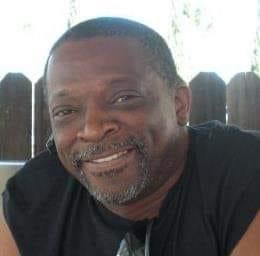
Another profound “wow” moment was when I was a sophomore. There was a group home staff member, his name was Monroe B., and he is an African American gentleman. He and I had a great relationship in terms of staff/child relationship. He was an awesome man. He disappeared from the group home and I remember telling YC, “Hey, what happened to Monroe? I haven’t seen him in a couple of weeks, is he still working here?” And she could not tell me why Monroe was not working at the group home anymore.
MONROE WANTS ME TO LIVE WITH HIM
Months went by and Monroe wasn’t there and finally YC pulled me aside. I think we were in therapy, and she told me, “Hey, what do you think about this idea of living with Monroe?” I was 16 years old, and I was like “Whaaat?” I thought that would be amazing. I would love that. I told them I would love that for many reasons. He and I had a great relationship, he was African American, which was another positive. He could identify and I could relate to him. I wouldn’t feel awkward being in his presence around other people, because we had similar pigment.
YC told me that Monroe was participating in this program through Walden Family Service, which is a foster and adoption agency down in San Diego. And Monroe was doing this training for several months. And because he was working to be a foster parent and working to take me in as his foster child, because of the conflict of interest, he was not able to work at the group home while I was living there. I think he was working a 2nd job to support himself.
I AM NO LONGER A GROUP HOME KID AND I HAVE MY OWN HOME
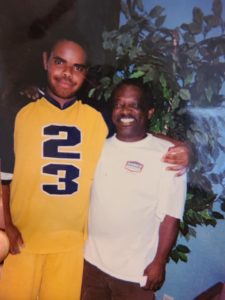
It was incredible for Monroe to do what he did. And he took a significant pay cut, because he wasn’t getting paid, to take me out of this environment he felt that I didn’t deserve to be in. I for sure thought that I was going to be a group home kid until I graduated. Because for kids like me, young African American kids, with quote/unquote emotional disturbance issues, we don’t get fostered. We are group home kids.
So now, I am out of the group home, I am 16 years old, I am a sophomore in high school, and I transitioned from this group home to go live with Monroe.
That summer, I was like a free kid, no longer living in the group home. My neighbor Kendu and I were just the best homies. Two young African-American kids with huge afros–it was just awesome. And so, with that freedom, Kendu and I would go ride our scooters across town to go to the YMCA, we would run 4 or 5 basketball games. Kendu’s mother, Carol, had to get herself finger printed so she could be a secondary helper and take us to school when Monroe had to work a 2nd job.
I START TO LOSE WEIGHT
And then, I kid you not, coming back, my junior year in high school, I lost so much weight, people were looking at me. They used to call me Bubba in high school because I was always such a big kid. I lost about 55 to 60 pounds that summer. Before that, I was wrestling as a heavyweight, 275-285 is the cutoff line. When I came back to school, I was like 230 lbs, because Kendu and I were just running and playing around all summer. I didn’t even realize it till I jumped on a scale for preseason wrestling and I was 230lbs. So I ended up losing 15 lbs, this time intentionally, so I could make the 215 lb weight class. For the next 2 years after that, I wrestled at 215 and I dropped all the way down to 198. I was able to lose over 80-90 lbs. And I mentioned to you I went off that medication. What a sense of freedom!!
I was also playing football, but we were doing a nighttime practice. I didn’t know why it was pitch black here with no lights. (It was because of the retinitis pigmentosa causing night blindness). So at that point, I said I was not going to subject myself to this football environment and tax myself.
Wrestling was just so much more fun, all my friends were wrestling and I just stayed with that. It built character and resilience , it was a great situation for me. Imposing yourself physically on someone was great, because sometimes I had built up anger and emotion and I could express myself in a healthy way.
I MAKE THE MOST OF MY HIGH SCHOOL
My senior year was so nice. I had 4 classes and I got to leave school early, so I made my own class in senior year. I didn’t want to go home after school, because I had sports later on, so I made my own class. I took care of this kid, Josh, who had cerebral palsy. He was a kid in the special ed class at school. I’d hang out with him, feed him, take him to his class. It was me hanging out with him for 2 periods. That’s where my appreciation for working with people with disabilities came in. It was me and Josh for my whole senior year, I was helping him.
Some people hated their high school. I loved high school. If you could go back and do something better, I don’t think there was anything I would have done differently. I was so involved, I was in the Future Farmers of America, taking care of pigs and cattle, I was in the agriculture department building gardens. I took advantage of being in school.
Act 3 is from 24 to the present day. That is kind of how I view my life story.
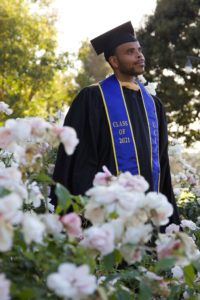
Joseph went to college and graduated from UCLA with a masters in social welfare. His retinitis pigmentosa diagnosis spurred him to help people with vision loss. He is now the president and co-founder of Hearts For Sight, a nonprofit that helps visually impaired people maintain their physical, emotional and mental well-being.
REFLECTIONS
There still are a lot of adverse childhood experiences that I have to cope with and live with everyday, but, you know, I am a graduate of UCLA!! Who would have thought that growing up? When you hear what I am telling you now, UCLA would never have been in the cards. It wasn’t in my cards.
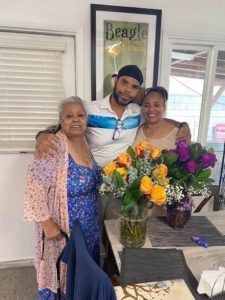
Looking back, being in foster care was sad but it was also the best thing that happened to me to prepare me for my adult life. Though I lost my family connections, I would not have accomplished as much as I have done today. I have better emotional balance and better relationships, I think it is so important to choose the right company to keep.
HEARTS FOR SIGHT Hearts for Sight Foundation
For me, recognizing that losing my sight was an inevitable experience, knowing that I need to prepare and adjust, knowing that I could experience blindness in the future, I needed to take care of myself. I needed to have a level of self-sufficiency and productivity, and so when I was 24-25, I started to go to the Braille Institute in San Diego.
I went to be prepared. I needed to know what resources are available to the blind and the visually impaired community, and I wanted to be around other people who are adjusting to their blindness. Being in that setting, I realized that I had an ability to teach and to educate along with having a healthy lifestyle. So I started going to classes and volunteering. I helped develop a nutrition curriculum and helped in an assistive technology class where I assisted people with iPhone accessibility like Zoom and voiceover.
After spending some time at Braille, I realized that there was a void in accessible health and wellness services for the blind. It was so illuminating, so visible, just right in your face. Seeing the way people ate and the lack of physical activity. I felt the need to create a program that would break down barriers to health and wellness services to help visually impaired people with their physical and mental health.
At the time, it was just physical health, but as I got more involved in psychology and social work, I started developing more of a mental health component. And that is where Hearts For Sight is at today, improving the physical and the mental health of blind and visually impaired people. Our outdoor programs, connecting people to nature really serve to address the mental and the physical health needs of our community.
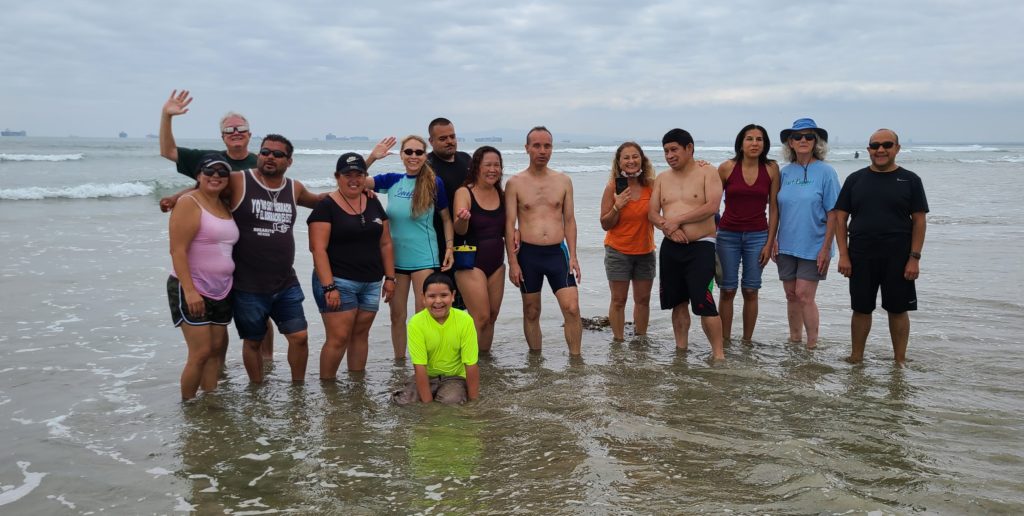
Joseph sees himself in Act 4 of his life. He lives in the LA area with his wife, Bernice, and their 2 beagles, Frida and Zeus. He is working hard to grow and develop Hearts for Sight so that they can provide more mental health services, outings and social events for the visually impaired community.